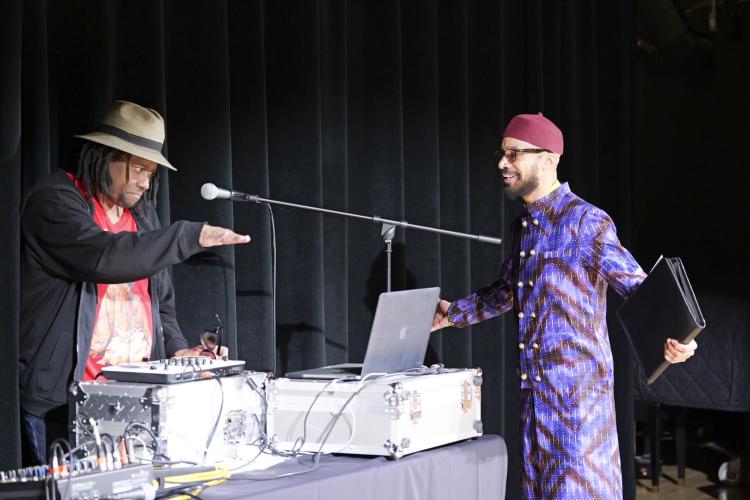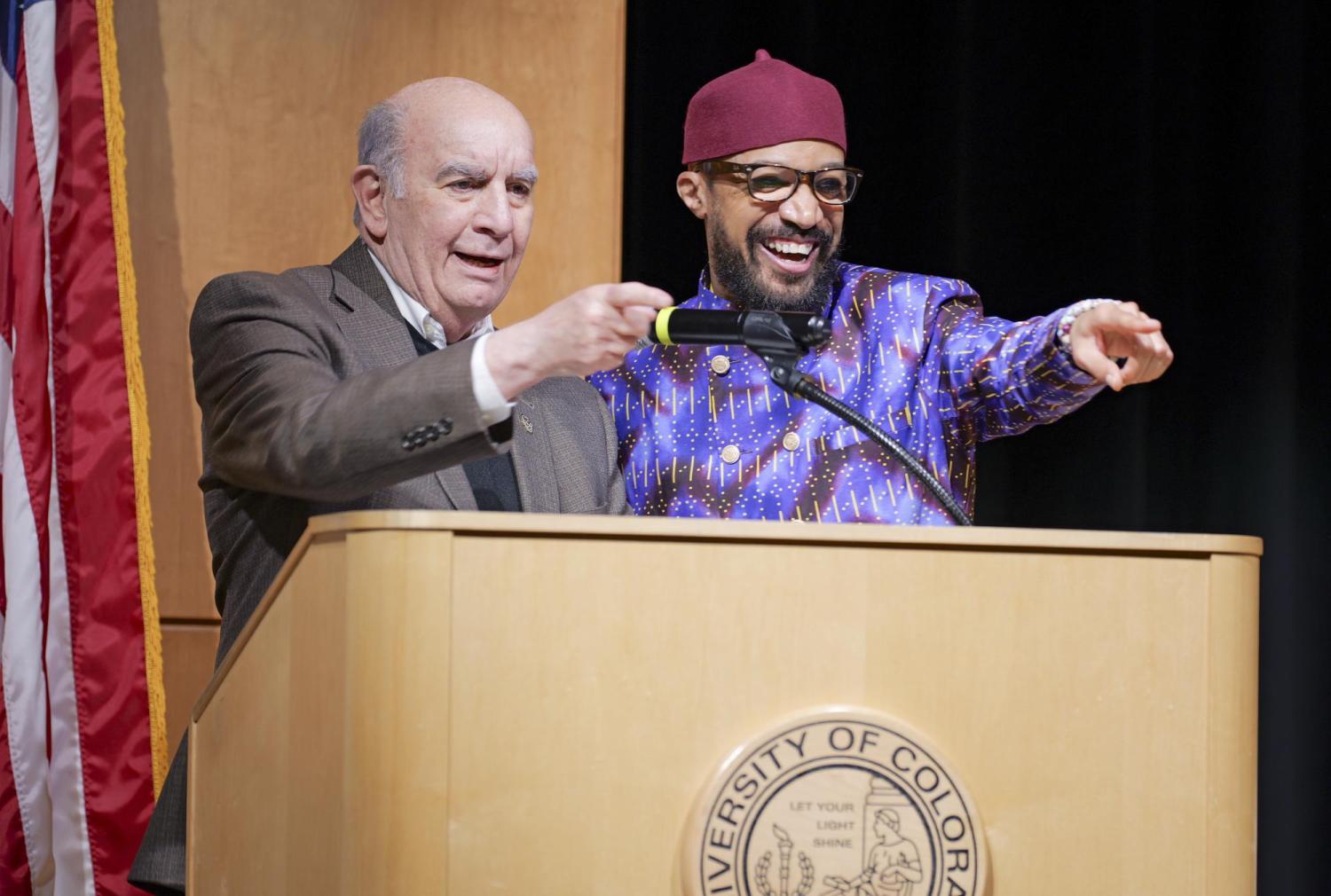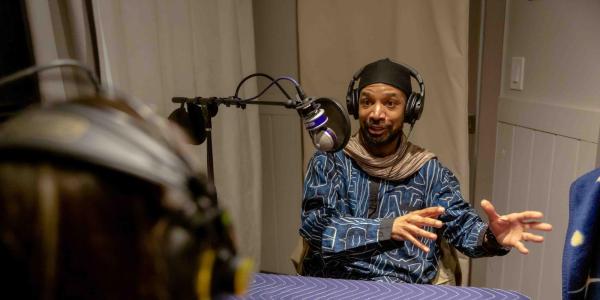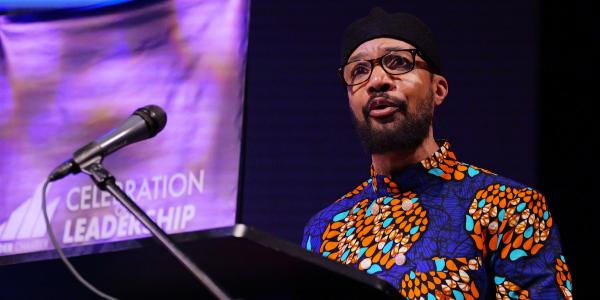Co-star of The Color Purple joins Colorado governor, CU president and chancellor, along with a cadre of artists, to celebrate the Center for African and African American Studies and Black History Month
Being Black on campus two decades ago was difficult, but the University of Colorado Boulder has worked to improve its culture, says Aba Arthur, who costarred in last year’s production of The Color Purple.
Arthur joined a half-dozen luminaries—including Colorado Gov. Jared Polis, CU President Todd Saliman, CU Boulder Chancellor Phil DiStefano and Boulder County NAACP President Annett James—to hail CAAAS Day, a Colorado event recognizing the university’s Center for African and African American Studies.
Because CAAAS Day falls on Feb. 1, the celebrants in the Glenn Miller Ballroom Thursday also marked the beginning of Black History Month.

CU Boulder graduate Aba Arthur, who co-starred in The Color Purple and Black Panther: Wakanda Forever, was a featured speaker at Thursday's CAAAS Day celebration. (Casey Cass/CU Boulder)
Arthur, who graduated in 2005 with a bachelor of fine arts in theatre and a minor in political science, took to the stage and reveled in the moment: “Wow, y’all, this is a moment. To walk up and see the words ‘Center for African and African American Studies,’ it’s amazing.”
She acknowledged all the work it took to create the center, noting that “every student wants to be respected and heard … their ancestry respected.”
Acknowledging the difficulties she faced at CU Boulder, she also praised the university, specifically mentioning Bud Coleman, professor of theatre and dance, who helped her get a comprehensive education. “I always credit CU and the Theatre Department for who I am today.”
CAAAS was officially launched on Feb. 1, 2023, and encompasses a research center, an arts program and student-service support. Reiland Rabaka, professor of African, African American and Caribbean Studies and the center’s founder and director, said the center was a “wild dream that we have worked long and hard to turn into a reality.”
He noted the university’s first Black graduates—Charles Durham Campbell in 1912 and Lucile Berkeley Buchanan in 1918—and added, “We are their wildest dreams.”
Tracing the 98-year history of Black History Month, Rabaka said, “Every month is Black History Month in the CAAAS.” He said he had always conceived of the center as a sanctuary, a place where people could come together in compassion to learn from the totality of Black experience.
“Here, we don’t have to make ourselves small. We can be who we are, Black and beautiful,” Rabaka said, crisply enunciating each syllable of “beautiful.”
Quoting Frederick Douglass, Rabaka noted that progress springs from agitation: “If there is no struggle, there is no progress. … Power concedes nothing without a demand. It never did, and it never will.”
Nonetheless, Rabaka praised the powerful people who came to celebrate the center. They returned the compliments.

Shawn O'Neal (left), a CU Boulder assistant teaching professor in Africana studies, and Reiland Rabaka, CAAAS founder and director, at the CAAAS Day celebration Thursday. (Casey Cass/CU Boulder)
Polis, who issued the proclamation establishing Feb. 1, 2023, as CAAAS Day, said Coloradans need to strive for equality not just in February, but all year, adding that the center was integral to the effort. “It’s a key part of our work of building a Colorado for all. … We want to make sure that everyone has a place to succeed in our state.”
Introducing DiStefano, Rabaka called the chancellor a “brother” and “mentor.” DiStefano said the center is achieving its goals to be a place of connection and creative expression.
Saliman, the university president, characterized Rabaka as a force to be reckoned with. “I brag about the CAAAS everywhere I go. It is such an incredible symbol of what CU Boulder commits to.”
Saliman added that the university is not diverse enough but that the center is a key to correcting the imbalance. People need a place where they belong, he said, so that “they don’t just want to come here; they want to stay here.”
Underscoring the center’s focus on the arts, J. Benjamin Burney, a graduate student in interdisciplinary media art practices, performed a spoken word poem. Shawn O’Neal, an assistant teaching professor in Africana studies, and Kalonji Nzinga, assistant professor in the School of Education, performed rap music. Jarrett Rashad, a professional dancer, did a dance performance set to poetry.
Closing the festivities, Rabaka said, “We are fighting for freedom not just for Black people, but for all people. Our destinies are intertwined. … Another way and another world is possible, but only if we work for it.”
Did you enjoy this article? Subcribe to our newsletter. Passionate about the Center for African and African American Studies? Show your support.










